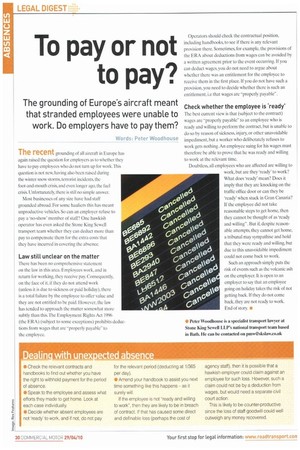To pay or not to pay?
Page 30

If you've noticed an error in this article please click here to report it so we can fix it.
The grounding of Europe's aircraft meant that stranded employees were unable to work. Do employers have to pay them?
Words: Peter Woodhouse
The recent grounding of all aircraft in Europe has again raised the question for employers as to whether they have to pay employees who do not turn up for work:this question is not new, having also been raised during the winter snow storms, terrorist incidents, the foot-and-mouth crisis, and even longer ago, the fuel crisis Unfortunately, there is still no simple answer.
Most businesses of any size have had staff grounded abroad. For some hauliers this has meant unproductive vehicles. So can an employer refuse to pay a -no-show' member of staff? One hawkish operator has even asked the Stone King Sewell transport team whether they can deduct more than pay to compensate them for the extra costs that they have incurred in covering the absence.
Law still unclear on the matter
There has been no comprehensive statement on the law in this area. Employees work, and in return for working, they receive pay. Consequently, on the face of it. if they do not attend work (unless it is due to sickness or paid holiday), there is a total failure by the employee to offer value and they are not entitled to be paid. However, the law has tended to approach the matter somewhat more subtly than this. the Employment Rights Act 1996 (the ERA) (subject to some exceptions) prohibits deduc tions from wages that are "properly payable" to the employee. Operators should check the contractual position, including handbooks, to see if there is any relevant provision there. Sometimes, for example. the provisions of the ERA about deductions from wages can be avoided by a written agreement prior to the event occurring. If you can deduct wages. you do not need to argue about whether there was an entitlement for the employee to receive them in the first place. If you do not have such a provision, you need to decide whether there is such an entitlement, i.e that wages are "properly payable".
Check whether the employee is 'ready'
The best current view is that (subject to the contract) wages are "properly payable" to an employee who is ready and willing to perform the contract, hut is unable to do so by reason of sickness. injury, or other unavoidable impediment, but a worker who deliberately refuses to work gets nothing. An employee suing for his wages must therefore be able to prove that he was ready and willing to work at the relevant time.
Doubtless, all employees who are affected are willing to work, but are they 'ready' to work? What does 'ready' mean? Does it imply that they arc knocking on the traffic office door or can they be 'ready' when stuck in Gran Canaria? If the employee did not take reasonable steps to get home, then they cannot be thought of as 'ready and willing". Rut if, despite reasonable attempts, they cannot get home. a tribunal may sympathise and hold that they were ready and willing, but due to this unavoidable impediment could not come back to work.
Such an approach simply puts the risk of events such as the volcanic ash on the employer. It is open to an employer to say that an employee going on holiday takes the risk of not getting back. If they do not come back, they are not ready to work. End of story •




























































































































